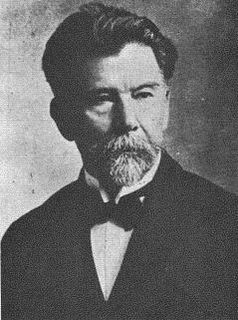 |
|---|
| This article is part of a series on the politics and government of Colombia |
Constitution |
Legislature |
Executive |
Related topics |
Presidential elections were held in Colombia in February 1922. [1] The result was a victory for Pedro Nel Ospina of the Conservative Party, who received 62% of the vote. [2] He took office on 7 August. [3]

Colombia, officially the Republic of Colombia, is a sovereign state largely situated in the northwest of South America, with territories in Central America. Colombia shares a border to the northwest with Panama, to the east with Venezuela and Brazil and to the south with Ecuador and Peru. It shares its maritime limits with Costa Rica, Nicaragua, Honduras, Jamaica, Haiti, and the Dominican Republic. Colombia is a unitary, constitutional republic comprising thirty-two departments, with the capital in Bogota.

The Colombian Conservative Party is a conservative political party in Colombia. The party was formally established in 1849 by Mariano Ospina Rodríguez and José Eusebio Caro.
His main opponent, Benjamín Herrera of the Liberal Party, was also supported by the Socialist Party. [2] The Liberal Party claimed that the election had been marred by blatant fraud. [2]

Benjamín Herrera was a Colombian politician and general. Born in Cali, Colombia in 1853. In 1875, while he was a student at the University of Cauca, Herrera joined the liberal army under César Conto to topple the conservative governor of Antioquia. He fought in the civil war for a decade until 1885, when the liberal forces were defeated and he decided to settle down in Pamplona, Colombia. In 1895 he returned to the political scene, gaining resources for a new liberal army against a new conservative governor. In the Thousand Days' War he became the main military strategist on the liberal side of the war, and, second to Rafael Uribe Uribe he became the main figure of Colombian liberalism. After the war, in 1905, he was elected to the Chamber of Representatives of Colombia. In 1905 and early 1906, he commanded the Colombian army forces confronting Venezuela, In 1909 Herrera became a senator, and in 1914 he became Minister of Agriculture under the government of Jose Vicente Concha. In 1922 he was the presidential candidate for the Colombian Liberal Party. He founded the Universidad Libre in 1923. Herrera died in 1924.

The Colombian Liberal Party is a centrist and social liberal political party in Colombia. It was founded as a classical liberal party but later developed a more social-democratic tradition, joining the Socialist International in 1999.





